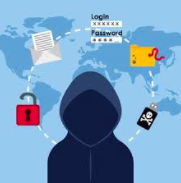Identity theft is now the fastest growing crime in America. It happens when a criminal wrongfully obtains and uses the personal information belonging to someone else – perhaps to you. Such personal information may include your Social Security number, credit card numbers, or the ATM PIN code for your bank account. Although you may think you are careful with this information, identity thieves are clever and can obtain this information in any number of ways.
A popular method is “shoulder surfing” where the thief just stands near the ATM and watches as you key in your PIN. Or the thief may listen in on your phone conversation as you make hotel reservations with a credit card. A new way people could get your information is from a device being attached to the credit card scanning section of the gas pump.
ID thieves can also utilize “phishing” as a way to get your personal information. They send out fake e-mails, purportedly from banks, online retailers with whom you have made a purchase, or credit card companies, indicating that there is a problem with your account. In order to “verify” your account, they ask for your Social Security Number and other information. Many people respond in good faith to these inquiries, and as a result, their identities are often stolen.
Another tactic scammers employ is to try to get ahold of your personal email address, and if he or she does, they can take over all of your accounts. Though it is true that many sites you may visit give you an option to use your email address for login purposes, try to choose a login name other than your email address or personal name.
These are just a few ways identity thieves work to get your information, and as quickly as someone shares an experience or way they have been targeted, a new scam is in place. Here are several things you can do to protect yourself from having your identity confiscated.
- If you have to give out personal information over the phone, make sure you know who is at the other end of the line. Also, make sure no one is close by, listening to your conversation. When using an ATM, ensure that no one is watching you.
- Shred all bank statements and credit card bills before you throw them away.
- Do not respond to any e-mail inquiries asking for personal information without first calling the sender.
- Go with your gut- if something doesn’t look right, seem right, or sound right, it may not be! A questioning phone call to double-check the truthfulness of a request is well worth your time.
The Insurance Information Institute suggests looking into your homeowners’ policy, as some companies automatically add identity fraud and theft coverage to the primary homeowners. And remember, if some of these tips, ideas or suggestions seem like an inconvenience, security and ease of use aren’t always compatible.

